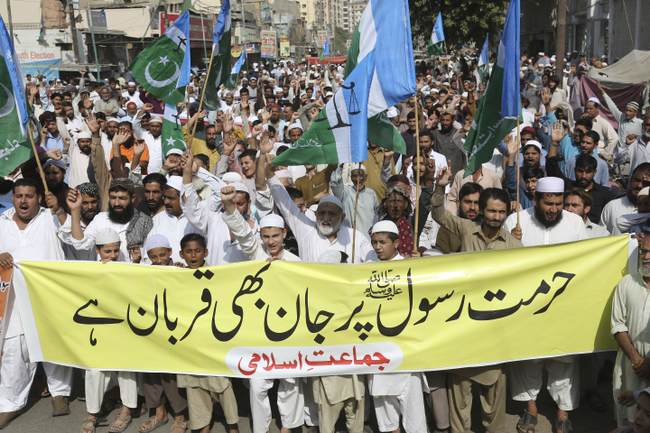
For Pakistani dissident journalists, scholars, and activists, leaving the country due to pressures and death threats may not present a safe solution. The threats from Pakistan’s government and its supporters often continue even when those journalists end up in exile. Sometimes, the result is deadly violence.
October 23 marked the third anniversary commemorating the murder of Arshad Sharif, a Pakistani journalist. He was shot and killed in Kenya by local police in 2022. Sharif had escaped harassment by the Pakistani military establishment due to his journalistic work.
The murder remains unresolved. The Kenyan police described the shooting as a case of “mistaken identity,” yet many believe the journalist was assassinated. Sharif’s widow, Javeria Siddique, said it was a contract killing carried out on behalf of an unnamed individual in Pakistan.
Arshad Sharif was a TV anchor known for his robust criticism of Pakistan’s military leaders and political corruption. The father-of-five received death threats that he had flagged to Pakistan’s top judge before fleeing his home country to seek safety abroad.
Sharif’s murder two months later at the hands of police caused outrage. The slow response by officials even prompted UN experts to criticize both Kenya and Pakistan.
Sharrif was not the only victim of Pakistan’s transnational repression (TNR) of its dissident citizens. This repression often comes in the form of harassment, surveillance, coercion, and, in some cases, extraterritorial killing, kidnapping, violence, or threats of violence.
According to Freedom House, transnational repression includes actions by a state to silence, intimidate, or harm critics abroad while violating the sovereignty of host countries and the civil liberties of their residents.
Over the past few years, several Pakistani dissidents have died under suspicious circumstances abroad. This points to a disturbing pattern of transnational repression. Some examples include journalist Sajjid Hussain in Sweden, and human rights activist Karima Baloch in Canada. In the Netherlands, a murder-for-hire plot that targeted blogger Waqas Goraya led to a conviction in 2022.
According to the Tom Lantos Human Rights Commission of the United States House of Representatives:
In the 77 years since Pakistan became independent in 1947, its governments have had a generally poor record of respect for human rights and democracy. The Pakistani military has directly governed Pakistan for 33 of those 77 years. In its Freedom in the World 2024 report, Freedom House noted that in Pakistan, ‘the military exerts enormous influence over government formation and policies, intimidates the media, and enjoys impunity for indiscriminate or extralegal use of force.’
Many date the current phase of repression in Pakistan to 2022, when, with the involvement of the Pakistan military, popular Prime Minister Imran Khan was ousted, and soon after, arrested, convicted of corruption, and imprisoned. His political party, Pakistan Tehreek-e-Insaf (PTI), and many of his followers were sharply repressed. Parliamentary elections in February 2024 were, according to the U.S. State Department, marked by ‘undue restrictions on freedoms of expression, association, and peaceful assembly,’ as well as “electoral violence, and restrictions on the exercise of human rights and fundamental freedoms.
The U.S. State Department’s 2024 Country Report on Human Rights Practices also notes significant human rights issues perpetrated or tolerated by the government of Pakistan. These include the following: unlawful or arbitrary killings; disappearances; torture or cruel, inhuman, or degrading treatment or punishment; transnational repression against individuals in another country; serious abuses in a conflict; serious restrictions on freedom of expression and media freedom, including violence against journalists, unjustified arrests and disappearances of journalists, and censorship; restrictions of religious freedom; threats of violence motivated by antisemitism; and significant or systematic restrictions on workers’ freedom of association.
The report notes:
The government allegedly engaged in transnational repression to intimidate or extract reprisal against individuals outside its borders, including civil society activists, human rights defenders, and journalists… Some activists alleged the government killed and kidnapped persons in other countries for politically motivated reprisal…
In May, Baloch human rights activist Mahrang Baloch reported harassment and surveillance by Pakistani state officials while participating in a human rights symposium in Norway. Independent international media also alleged she was followed by state-sponsored individuals.
In a more recent case, Roshaan Khattak, a Pakistani human rights defender and film maker, was targeted while he was researching enforced disappearances in Balochistan (a province of Pakistan) at the University of Cambridge.
A 2025 letter signed by several human rights groups and scholars highlights the challenges that he has faced, the gaps in the institution’s response to the threats, and what the broader sector must do to ensure everyone in the academic space is protected. The letter said, in part:
On 21 December 2024 Mr Khattak received a message warning that neither Cambridge nor the UK is “safe” for him or his family if he continues his research into enforced disappearances in Balochistan (a province in Pakistan). While the origin of the threat is unknown, there are allegations that the Pakistan military and Inter-Services Intelligence (ISI) agency have targeted those in exile, including Shahzad Akbar and journalists Syed Fawad Ali Shah and Ahmed Waqass Goraya. This also comes at a time when work on human rights violations in Balochistan is increasingly dangerous, as evidenced by the suspicious deaths of Sajid Hussain and Karima Baloch. Despite police awareness of the threat, Mr Khattak reports that his progress towards his PhD has been stopped for now, with Wolfson College having also repeatedly cancelled meetings, revoked his accommodation and changed the locks to his room without notice, limiting access to and compromising his sensitive research materials and data. They have also encouraged him to fundraise from the Baloch community in the UK to secure private accommodation, therefore disregarding the university’s responsibilities to him. We believe that the university should be exploring ways to ensure Mr Khattak’s safety, in collaboration with the relevant authorities, instead of trying to put him out of sight, out of mind. MPs including John McDonnell and Daniel Zeichner, as well as the UN Special Rapporteur on Human Rights Defenders, Mary Lawlor, and other leading human rights defenders have raised awareness of this case or shared their concerns with the University. Additionally, McDonnell has submitted an Early Day Motion in UK Parliament, backed by cross-party support, drawing attention to the threats faced by Roshaan and the wider impact of TNR on UK academia.
First Pakistan Global (FPG), a U.S.-based nonprofit organization committed to advancing democracy, protecting human rights, and strengthening civil society in Pakistan, further validates that the country’s military regime engages in transnational repression through abductions, threats, surveillance, and coercion targeting those who criticize Pakistan. Pakistani embassies and courts are used as tools of intimidation, while families in Pakistan are targeted to silence dissent abroad. For instance, reporter Ahmad Noorani’s elderly mother is being harassed by the Pakistani Army Chief’s staff: both her pension and phone access are blocked in retaliation for his reporting.
Noorani is a U.S.-based journalist and the founder of Fact Focus. His brothers were abducted by Inter-Services Intelligence (ISI) agents in Islamabad after he published an exposé on alleged corruption involving General Asim Munir.
According to a 2025 report, “Countering Transnational Repression Targeting Pakistani American Pro-Democracy Advocates,” written by First Pakistan Global:
Transnational Repression emanating from Pakistan is reaching new heights. It now seriously threatens the freedoms guaranteed to American citizens and residents under the U.S. Constitution.
On June 14, 2025, Pakistani American communities from across the United States staged a peaceful demonstration outside the Embassy of Pakistan in Washington, DC. Within 48 hours, Pakistani authorities—utilizing electronic surveillance and internal databases—identified the relatives of key speakers inside Pakistan and abducted several of them. While a few Americans have since reported these incidents to the FBI, most victims have been intimidated into silence. Although the FBI has continued documenting such instances, the failure of both the FBI and the Department of Justice to pursue concrete, deterrent actions have emboldened Pakistan’s military-led regime to expand its campaign of silencing dissent across borders.
In an alarming new phase, Pakistani courts—now functioning as tools of the executive—have begun issuing directives to U.S.-based technology companies to censor dissent originating abroad. In early July 2025, multiple journalists and content creators based in the United States, Canada, the United Kingdom, and Australia received notifications from Google/YouTube informing them that Pakistani magistrates had ruled their YouTube channels to be in violation of Pakistan’s cyber laws. The platform warned that unless these individuals complied with the Pakistani court orders—despite operating entirely within countries with strong constitutional protections for free speech—their channels could be removed without further notice.
The report notes:
The unchecked spread of transnational repression threatens the safety of American residents and the democratic values of the United States. If left unaddressed, it will encourage the authoritarian regime of Pakistan to expand their reach into diaspora communities with impunity. The United States must act now to protect its citizens, reaffirm its commitment to human rights, and send an unequivocal message that repression will not cross borders unchecked.
Editor’s Note: The Schumer Shutdown is here. Rather than put the American people first, Chuck Schumer and the radical Democrats forced a government shutdown for healthcare for illegals. They own this. Help us continue to report the truth about the Schumer Shutdown. Use promo code POTUS47 to get 74% off your VIP membership.










